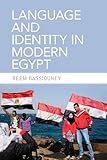Language and Identity in Modern Egypt / Reem Bassiouney.
Material type: TextPublisher: Edinburgh : Edinburgh University Press, [2022]Copyright date: ©2014Description: 1 online resource (416 p.) : 4 B/W illustrationsContent type:
TextPublisher: Edinburgh : Edinburgh University Press, [2022]Copyright date: ©2014Description: 1 online resource (416 p.) : 4 B/W illustrationsContent type: - 9780748689644
- 9780748689651
- 306.440962 22
- P40.45.E3 B38 2014
- P40.45.E3 B38 2014
- online - DeGruyter
| Item type | Current library | Call number | URL | Status | Notes | Barcode | |
|---|---|---|---|---|---|---|---|
 eBook
eBook
|
Biblioteca "Angelicum" Pont. Univ. S.Tommaso d'Aquino Nuvola online | online - DeGruyter (Browse shelf(Opens below)) | Online access | Not for loan (Accesso limitato) | Accesso per gli utenti autorizzati / Access for authorized users | (dgr)9780748689651 |
Browsing Biblioteca "Angelicum" Pont. Univ. S.Tommaso d'Aquino shelves, Shelving location: Nuvola online Close shelf browser (Hides shelf browser)

|

|

|

|

|

|

|
||
| online - DeGruyter The Ethics of Deconstruction : Derrida and Levinas / | online - DeGruyter Anthropomorphism in Islam : The Challenge of Traditionalism (700-1350) / | online - DeGruyter The Semantics of Word Formation and Lexicalization / | online - DeGruyter Language and Identity in Modern Egypt / | online - DeGruyter Contemporary British Horror Cinema : Industry, Genre and Society / | online - DeGruyter The Handbook of Creative Writing / | online - DeGruyter Postcolonial Literature / |
Frontmatter -- Contents -- Expanded contents list -- List of maps, figures, and tables -- List of abbreviations -- Transcription, glosses, and transliterations -- Acknowledgements -- Introduction: language and identity in modern Egypt -- 1. Identity and beyond: setting the framework of analysis -- 2. A historical overview of the development of national identity in modern Egypt with reference to language: the formative period -- 3. “Arabic” indexes amidst a nation and a nation-state: ideologies, attitudes, and linguistic realities -- 4. Social attributes of Egyptian identity -- 5. Identity and narration in Egypt -- 6. The politics of identity and linguistic unrest: the case of the Egyptian Revolution -- 7. Conclusions -- Appendix: chronological list of songs examined -- Bibliography -- Index
restricted access online access with authorization star
http://purl.org/coar/access_right/c_16ec
Examines language and identity in modern Egypt using theories from discourse analysis and sociolinguisticsGBS_insertPreviewButtonPopup(['ISBN:9780748689668','ISBN:9780748689651','ISBN:9780748689644']);How is language used in Egyptian public discourse to illuminate the collective identity of Egyptians? How does this identity relate to language form and content? Reem Bassiouney explores these questions by drawing on sources including newspaper articles, caricatures, blogs, patriotic songs, films, school textbooks, TV talk-shows, poetry and novelsAs well as furthering our understanding of the relationship between identity and language, this book yields insights about the intricate ways in which media and public discourse help shape and outline identity through linguistic processes.Key FeaturesOffers an in-depth study of identity in modern Egyptian public discourseFocuses on nationalist discourse before, during and after the Egyptian revolution of 2011Based on a broad, and representative selection of dataHelps us to decode and understand the messages put forward by the competing factions in Egyptian politics"
Mode of access: Internet via World Wide Web.
In English.
Description based on online resource; title from PDF title page (publisher's Web site, viewed 29. Jun 2022)


